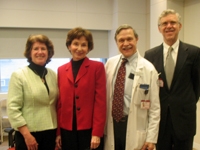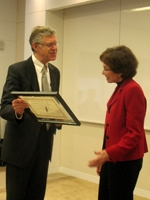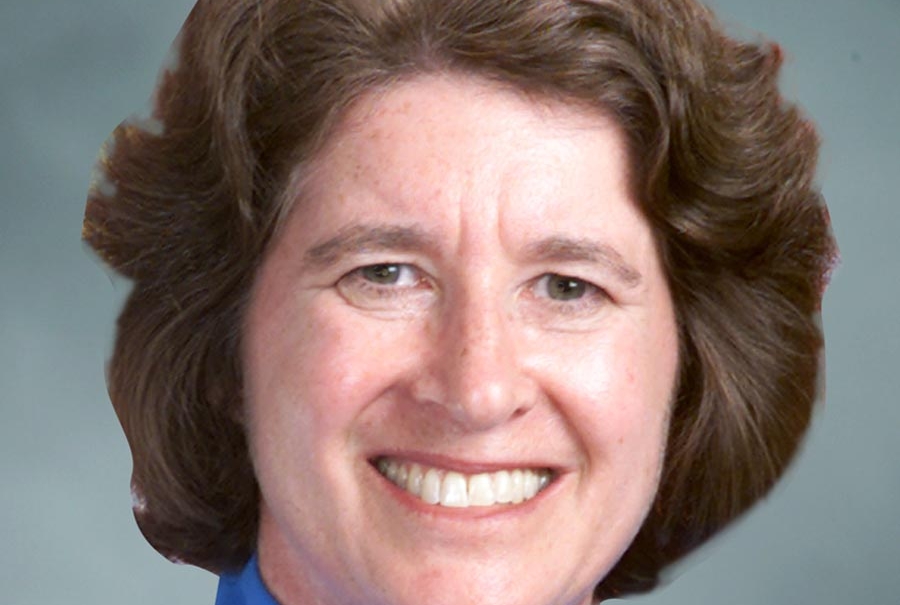As the former editor of the New England Journal of Medicine, Dr. Marcia Angell took a controversial stance when she wrote an editorial for the journal more than a decade ago titled, "Is Academic Medicine for Sale?" On May 4, Dr. Angell continued this theme during a lecture in the Weill Greenberg Center.
"The boundaries between academic medicine and the pharmaceutical industry are dissolving, and the differences between their missions are blurred," Dr. Angell said during her lecture at the David Rogers Health Policy Colloquium. Dr. Angell spent the day on campus as the Department of Public Health's 2011 Lorraine and Ralph Lubin Distinguished Visiting Professor.

Dr. Marcia Angell (second from left), the 2011 Lubin Visiting Professor, with (from left) Dr. Madelon Finkel, Dr. Oliver Fein and Dr. Alvin Mushlin.
In 2000, Dr. Angell wrote in her NEJM editorial about the extent to which academic medicine was becoming intertwined with the pharmaceutical and biotechnology industries. Her piece generated a firestorm and the journal was inundated with letters to the editor.
The situation persists, according to Dr. Angell, who left the New England Journal of Medicine in 2000 and is now a senior lecturer in global health and social medicine at Harvard Medical School. She argues that the influence of the pharmaceutical industry has penetrated deeply not just into research, where it has always played some kind of role, but also into the teaching and practice of medicine, influencing research agendas and potentially stifling the discovery of innovative drugs in favor of profitable ones.
Dr. Angell said that legislation enacted decades ago has made it easier for companies, not scientists, to control research. "Drug companies now design studies to be carried out by researchers they hire. The companies collect and analyze the data and often write the papers themselves."

Dr. Mushlin presents a plaque to Dr. Angell.
Even when the papers are written by the researchers, and their potential conflicts of interest spelled out in the bylines, the opportunity for bias still exists, she said, because negative results can be suppressed, and the trials can be manipulated.
"It's possible to make clinical trials come out pretty much however you want them," Dr. Angell said. The most troubling aspect of the marriage between industry and medicine, Dr. Angell said, is on the academic side, where she sees the influence at its greatest and least justified.
"Industry pays doctors to take courses, simply buying access to faculty and doctors both in training and practice," she said. "It is marketing masquerading as education. Industry has no legitimate role in graduate or postgraduate education; this is the responsibility of the profession whose only fiduciary responsibility is the patients and the public."
Dr. Angell frequently contributes to both medical journals and the popular media on a wide range of topics, particularly medical ethics, health policy, the interface of medicine and the law, and end-of-life health care. She has written chapters in several books dealing with ethical issues in medicine and health care, and she is known for her criticism of the U.S. health care system and the pharmaceutical industry.
The Lorraine and Ralph Lubin Distinguished Visiting Professorship in the Department of Public Health was endowed by Dr. Madelon Lubin Finkel, professor of clinical public health and director of the Office of Global Health Education at Weill Cornell, in memory of her parents. The Lubins strongly believed in the value of education as a means to making a difference in the lives of others. Over the past 10 years, each recipient of the annual award has achieved the highest recognition in either the field of epidemiology or health care policy and is regarded as an excellent role model for students. As part of the day-long event, the awardee has the opportunity to meet with students taking the public health clerkship as well as with interested first- and second-year students. The highlight of the day is the lecture presented at the Rogers Health Policy Colloquium.

